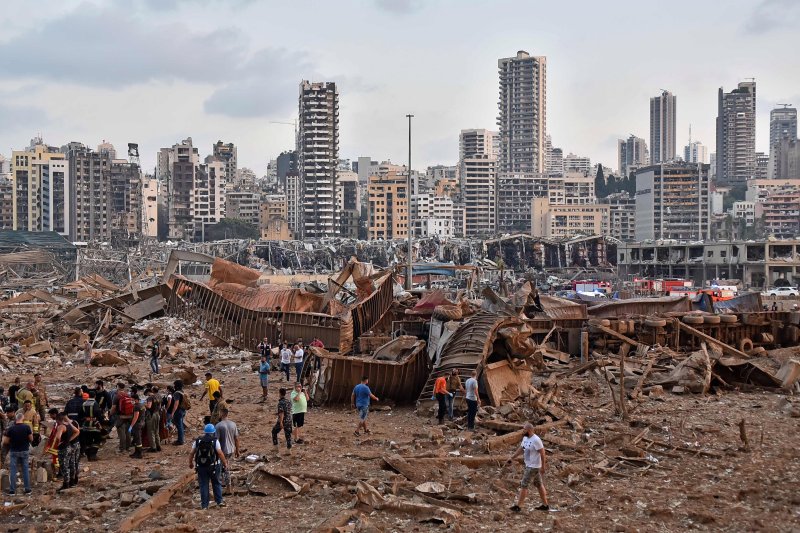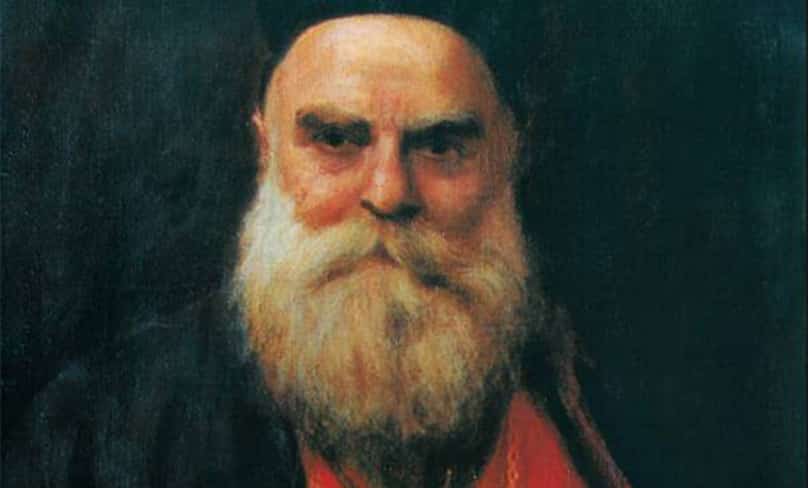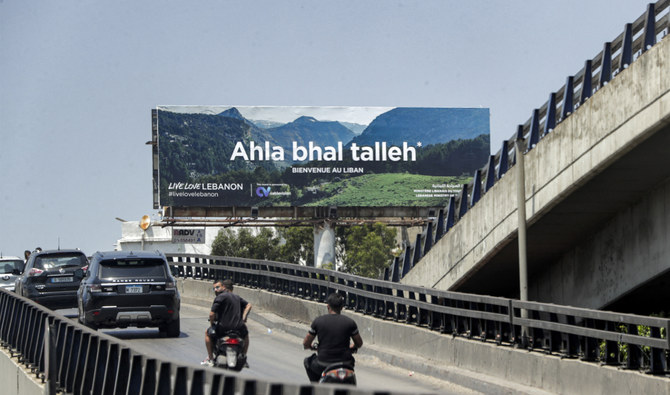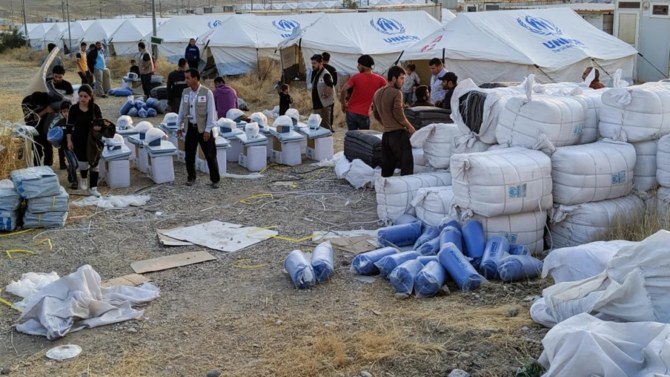
by Najia Houssari -- arabnews.com -- BEIRUT: Political officials in Lebanon’s ruling class came under fire on Saturday for suffering from “a moral crisis and the love for power” as the country celebrated Eid Al-Adha. The officials had apologized for not receiving any well-wishers on the holy occasion “due to the circumstances Lebanon is going through.” Dar al-Fatwa secretary Sheikh Amin Al-Kurdi condemned them during the Eid sermon. “The dignified, self-respecting people will not break in front of your corruption, thefts, and complex sick selves. You wasted their wealth and resources,” he said before hundreds of worshippers in the Al-Amin Mosque in the center of Beirut. “There’s no electricity, no water, no medicine, and no bread. Everything is obscenely expensive, and life has become arduous and compelling. “The people will remain, but the black pages of history will curse you generation after generation,” added Al-Kurdi, who led the Eid prayers instead of Grand Mufti Sheikh Abdul Latif Derian. The grand mufti is in Saudi Arabia to perform the Hajj.
Al-Kurdi said the Lebanese officials suffered from “a moral crisis and the love for power.” In his sermon, he asked: “Where is the prosecution of the killers of the martyred Prime Minister Rafik Hariri following the ruling of the international tribunal? Where’s the investigation into the Beirut Port blast? Where are the people’s financial rights lost in banks? Where’s the water, the electricity, the medicine, the food, and the fuel? Where’s the feeling of security and tranquility? When the captain of the ship is troubled, all the passengers will feel insecure.” Lebanon entered the holiday phase on Saturday ending next Tuesday. Political activities to form a new government were halted, and work on controversial matters was suspended. Prime Minister-designate Najib Mikati has not visited President Michel Aoun during the past couple of weeks to continue consultations over the draft Cabinet lineup and Aoun has yet to respond to Mikati’s proposed draft Cabinet.

by catholicweekly.com.au -- Dr Margaret Ghosn mshf -- Elias Boutros Howayek, born 4 December 1843 in Helta, North Lebanon, went on to become a priest (1870-1899), bishop (1889-1899) and Maronite Patriarch of Antioch (1899-1931).
Elias is considered one of the four founders of modern Lebanon alongside Fakhr el Din II, Bashir II and Youssef Beik Karam.
Elias Boutros Howayek’s Ordination to the Priesthood occurred on 5 June 1870 in Rome. He was of the view that:
- minimal education impoverished chances of advancement
- the neglected lacked dignity
- an occupied country experienced poverty of freedom
- distance from God was poverty of the human
As such, Elias committed his life to removing the causes of poverty and hardship from society.

By Najia Houssari -- arabnews.com -- BEIRUT: Saudi Arabia’s decision to drop COVID-19 restrictions for passengers traveling from Lebanon will provide great momentum for air traffic between Beirut, Riyadh, and Jeddah, an industry leader said on Friday. Jean Abboud, head of the Syndicate of Tourism and Travel Agencies, told Arab News that airlines had started programming their flights to Riyadh and Jeddah from Beirut. Most people were relieved by the move, he added. Saudi Arabia’s ambassador to Lebanon, Walid Al-Bukhari, tweeted on Thursday evening about the decision, as the Kingdom lifts precautionary measures during the Hajj season.
Lebanon’s caretaker Tourism Minister Walid Nassar thanked the Saudi leadership for allowing people to fly directly from Lebanon without the need to spend 14 days outside the country before entering Saudi Arabia. Nassar added that the Kingdom had always stood by Lebanon and the Lebanese, taking decisions that were “in the interest of our country.” Abboud said that previous measures had prevented about 60 percent of Lebanese people living and working in Saudi Arabia from returning directly from Beirut. “So they became more reluctant to fly out to Lebanon.
The Lebanese community in the Kingdom is quite large, and the Lebanese used to fly to Beirut very frequently, sometimes every weekend. However, the condition requiring them to stay 14 days in another country before returning to Saudi Arabia became a major waste of time and money. “Airlines are adjusting their flights to the Kingdom in light of the decision, especially since large numbers of Lebanese are currently spending their summer vacation in Lebanon and wish to return via a direct flight to Saudi Arabia." MP Bilal Al-Hashimi thanked Saudi Arabia for its decision. He said: “We are happy to return to the Kingdom of goodness, humanity, love, and giving, which has always been an example for Arab brotherhood. We all yearn for more such decisions that we are accustomed to from the Kingdom that has never left Lebanon. Rather, it has always provided support and aid, and it will always do so, especially in these virtuous days.”

By Najia Houssari -- arabnews.com -- BEIRUT: Lebanon has decided to formally negotiate refugee repatriation with Syria, a minister in the caretaker government said on Thursday. The Minister of Displaced Affairs Issam Sharaf El-Din said he would visit Damascus after the Eid Al-Adha holiday, making him the first Lebanese minister to visit the Syrian capital in an official capacity since 2011. Sharaf El-Din will discuss the plan to repatriate Syrian refugees in stages and “secure the executive mechanisms” for their return. He confirmed he had an official mandate from President Michel Aoun and caretaker Prime Minister Najib Mikati for the Syrian refugee issue.
BACKGROUND International organizations were trying to obstruct this issue by threatening to not help refugees if they returned to their country, said Minister of Displaced Affairs Issam Sharaf El-Din. According to Sharaf El-Din, the plan stipulated “the repatriation of 15,000 refugees per month” because Lebanon believed the war in Syria had ended and the country was safe. “Lebanon will not accept the non-return of Syrian refugees to their country.” Lebanon, which is already in crisis, says Syrian refugees are a heavy burden on basic services and infrastructure. According to Lebanese protesters, the refugees shared “our bread, which has turned into a rare commodity, and people are scrambling to get it in the past days.” Lebanese ministers have previously visited Damascus and met Syrian officials, despite the suspension of Syria's Arab League membership, but they have been keen to stress the visits were personal.
Khazen History


Historical Feature:
Churches and Monasteries of the Khazen family

St. Anthony of Padua Church in Ballouneh
Mar Abda Church in Bakaatit Kanaan
Saint Michael Church in Bkaatouta
Saint Therese Church in Qolayaat
Saint Simeon Stylites (مار سمعان العامودي) Church In Ajaltoun
Virgin Mary Church (سيدة المعونات) in Sheilé
Assumption of Mary Church in Ballouneh
1 - The sword of the Maronite Prince
2 - LES KHAZEN CONSULS DE FRANCE
3 - LES MARONITES & LES KHAZEN
4 - LES MAAN & LES KHAZEN
5 - ORIGINE DE LA FAMILLE
Population Movements to Keserwan - The Khazens and The Maans
ما جاء عن الثورة في المقاطعة الكسروانية
ثورة أهالي كسروان على المشايخ الخوازنة وأسبابها
Origins of the "Prince of Maronite" Title
Growing diversity: the Khazin sheiks and the clergy in the first decades of the 18th century
Historical Members:
Barbar Beik El Khazen [English]
Patriach Toubia Kaiss El Khazen(Biography & Life Part1 Part2) (Arabic)
Patriach Youssef Dargham El Khazen (Cont'd)
Cheikh Bishara Jafal El Khazen
Patriarch Youssef Raji El Khazen
The Martyrs Cheikh Philippe & Cheikh Farid El Khazen
Cheikh Nawfal El Khazen (Consul De France)
Cheikh Hossun El Khazen (Consul De France)
Cheikh Abou-Nawfal El Khazen (Consul De France)
Cheikh Francis Abee Nader & his son Yousef
Cheikh Abou-Kanso El Khazen (Consul De France)
Cheikh Abou Nader El Khazen
Cheikh Chafic El Khazen
Cheikh Keserwan El Khazen
Cheikh Serhal El Khazen [English]
Cheikh Rafiq El Khazen [English]
Cheikh Hanna El Khazen
Cheikha Arzi El Khazen
Marie El Khazen